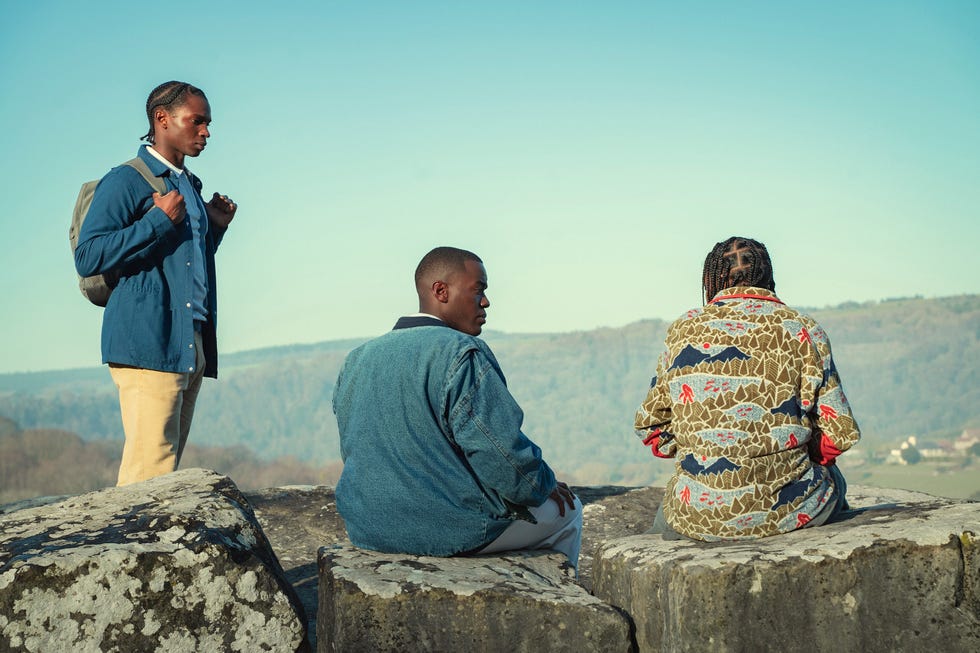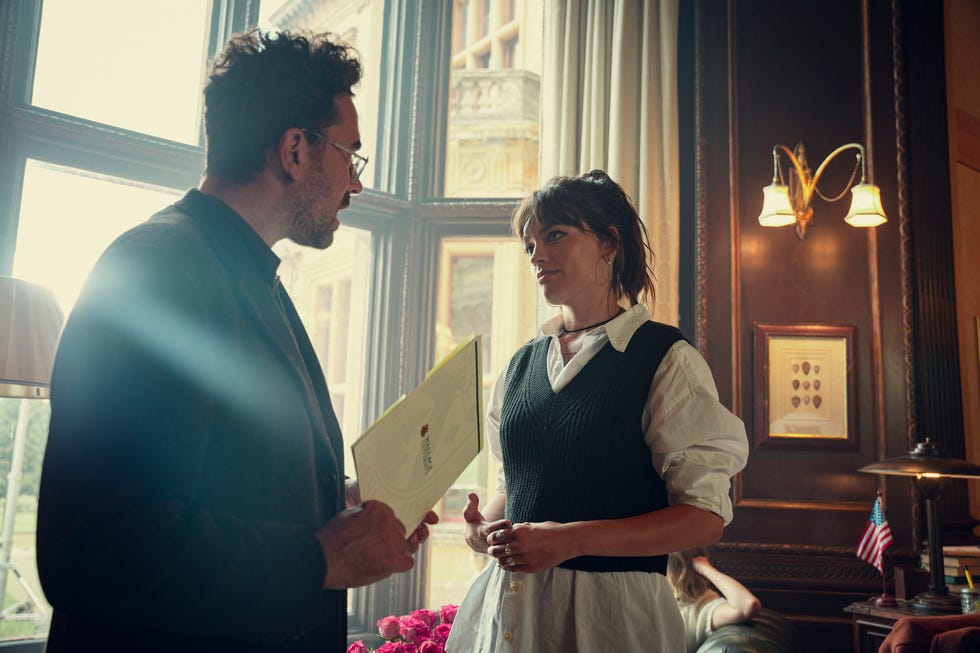Spoilers below.
Sex Education didn’t need to be this heartfelt to get our attention; plenty of so-called raunchy comedies have done more with less. But, since its inception, the Netflix series has put more stock behind an earnest, endearing approach to erotic humor than the shock-value tropes of sex comedies like Animal House or Superbad, or even the recent No Hard Feelings and Bottoms. That the bedroom antics of Otis, Eric, Maeve, Aimee, Adam, Cal, Jackson, Ruby, and literally dozens of other characters managed to feel both bawdy and wholesome is not an indictment of the show’s sex positivity, but instead a marker of its intelligent design. Over the course of its four seasons, Sex Education straddled that very real divide with all the gusto of…well, of a horny pubescent kid on the cusp of adulthood.
The final season of Sex Education only rarely zooms in on the actual act, which isn’t accidental. Particularly in season 4, the show mulls the idea that sex is complicated, beautiful, and aggressively over-stigmatized—but also that it’s a symptom of being human, not what makes us human. If we have reservations about our sex and our gender, that doesn’t mean we’re broken. If we delight in our sex and our gender, that doesn’t mean we’re whole. Our wants, our fears, our traumas and delights, they all feed into our relationship with sex, and as such the topic is worth being treated with tenderness and nuance—even, and perhaps especially, when it’s unbearably awkward.
At 85 minutes, the series finale does a particularly remarkable job resolving dozens of interconnected storylines, each predicated on the idea that our bodies are worth understanding in full. Otis (Asa Butterfield), having been unable to “perform” in bed thanks to his fear of heartbreak, finally has sex with Maeve (Emma Mackey) and faces the fallout. Maeve, having denied herself pleasures for most of her troubled childhood, makes a choice that’s solely for her own well-being. Adam (Connor Swindells) owns his bisexuality, and accepts the fact that his father’s influence will always shape him. Eric (Ncuti Gatwa) comes out in front of his entire church, and realizes he wants to be an inclusive pastor. Jackson (Kedar Williams-Stirling) discovers his biological dad’s identity; Vivienne (Chinenye Ezeudu) accepts that her boyfriend’s affection is not worth his abuse; and Cal (Dua Saleh) confronts the difficulty of living in a body they don’t identify with. That’s only a handful of examples, but the emerging pattern is clear.
The finale begins with another of Sex Education’s trademark not-quite sex scenes: The Cavendish College It Couple, Abbi (Anthony Lexa) and Roman (Felix Mufti), attempt to get it on. But after a few passionate kisses, Abbi opts to light her bedroom on fire so she needn’t put up with more of Roman’s moaning. It’s funny, of course, but also rather sad—exactly the type of material the series has thrived on since the beginning. That bittersweetness extends to the rest of the cast, as Otis realizes his mother’s influence on his breakup with Maeve; Maeve learns her book, Southchester, was good enough to warrant publisher attention; Aimee discovers what she wants her photography to “say”; and Jean (Gillian Anderson) takes a heartbreaking call from her sister, Joanna (Lisa McGrillis), during her Sexology radio show.
Still, the bulk of the episode revolves around the sudden disappearance of Cal, and the school-wide hunt to find them at their last-known location: the Pinelands Mall. There, the Moordale teens use Ruby’s considerable mean-girl clout to bribe the security guard for access to camera footage, with which they discover Cal left the property hours ago. But that’s not before they’ve had the chance to iron out a few interpersonal issues: The Cavendish cool kids confront Abbi on her toxic positivity, while Abbi finally admits her frustration with Roman’s noise levels in bed. O (Thaddea Graham) apologizes to Ruby (Mimi Keene) for bullying her as a bed-wetting kid; Aimee and Isaac (George Robinson) urge Vivienne to take her boyfriend’s jealousy seriously; and Eric gets a sign from God, in the form of a delightful Jodie Turner-Smith.
All of this leads Eric and Jackson to the local overlook, where Cal sits alone, staring at the river below. “I don’t think the world really wants people like me in it,” they tell Eric, to which he replies, “Things have to change, Cal, because people like us aren’t going anywhere.”
The beauty of this exchange rests not only in its fundamental truth, but in how it’s later reflected in the other characters’ actions. Otis finally recognizes that, in order for his friendship with Eric to continue, he needs to see his BFF in all his kaleidoscopic beauty, not merely in what Otis himself can relate with. And because Eric’s church is no longer willing to accept money from the annual Cavendish fundraiser—apparently on account of all the “progressive” student initiatives—the crew decides instead to donate the money toward Cal’s top surgery.
Finally, the fundraiser auction ends in the results of the student counselor election: Connor Pearson, Ruby’s last-minute candidate, wins the votes. But he rejects the role of Cavendish’s resident sex therapist—because “you guys have a lot of problems”—and so the title goes to Otis, who himself defers to O, with the duo ultimately deciding to team up as co-therapists on campus. Everybody gets a sex therapist! It’s a cheerful victory, sure, but Sex Education is smart enough not to end the series on such a definitive resolution.
Back at home, Otis assesses the still-raw wound of his breakup by reading the letter Maeve left for him before she returned to America, this time for good. She thanks him, not only for the relationship they shared as a romantic couple, but for the manner in which Otis “cracked open” her life and her heart from the beginning of their friendship. They would eventually go on to have sex, of course, and that sex would be more meaningful than either of them could likely put into words. (Although, give Maeve a few more years at school and a Southchester book deal, and you never know.) But the sex was an extension of the bond they’d already nurtured over four rollercoaster seasons—something Otis treats almost like a tangible presence beside him, as he stares out his bedroom window onto the river with which fans of the show have become so familiar.
In this way, Sex Education has always been a deeply wholesome series, one with a moral center that belies what might be an otherwise ribald, even polarizing subject matter. Since the show’s premiere in 2019, not every audience has been willing to recognize Sex Ed for what it was: provocative, yes, but generous, gentle, and profound. Yet for those of us who understood it (and loved it), we have also let the series “crack open” a small corner of our lives—and, let’s be honest, we’ll be all the sexier for it.
Culture Writer
Lauren Puckett-Pope is a staff culture writer at ELLE, where she primarily covers film, television and books. She was previously an associate editor at ELLE.


